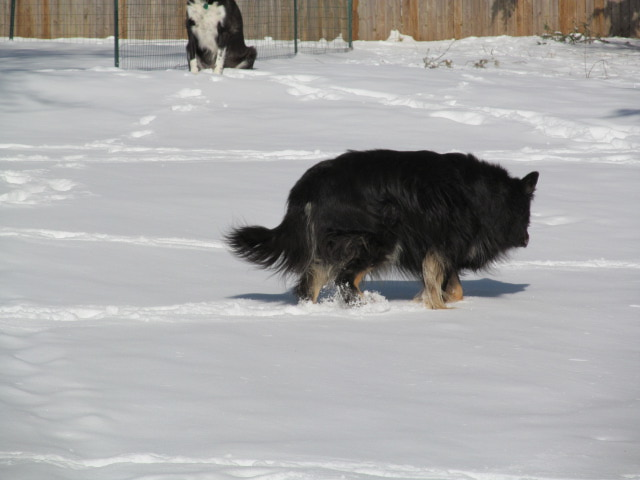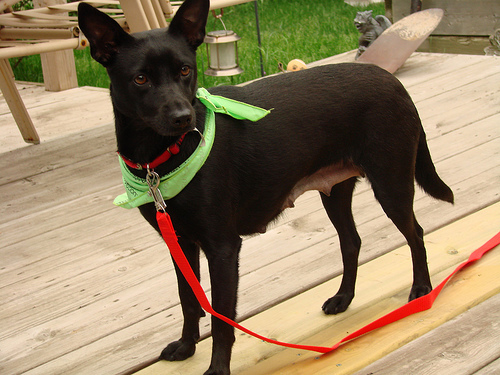QuestionHi Patti - My question is - my 15 pound mini poodle has a cataract. She is only 16 months old. She had her first cataract in her one eye when she was only 11 months old. She has now developed a cataract in her other eye. Is this common in a dog this young? When she had a cataract in one eye (which my vet diagnosed) our consensus was to watch it. Now that she has a cataract in her other eye I'm not sure what to do. For the first cataract, the vet said light was penetrating through. He does not know about the second as yet, because I just saw it myself recently. Does this mean that my dog will eventually go blind? My vet was surprised that a dog this young would develop a cataract - he said its usually in older dogs. Of course, I e-mailed the lady we purchaed her from when she had the first (I was curious if any other pups developed any complications) and I never heard from her. Any help or information you can give would be appreciated. This is actually my children's first dog, their ages are 14,17,18,and 24 and they love her dearly.
AnswerHi Darlene,
Your dog has what's known as "juvenile cataracts". This genetic defect produces cataracts in both eyes, in puppies and young adults. It is a recessive gene, which means that you can breed 2 dogs with no visible eye problems together and have puppies who will develop the condition. It's in the breed, and it can happen to even the best intentioned of dog breeders. Still, it's quite irresponsible of your breeder not to return your message!
These cataracts may progress to blindness, or they may remain small and not interfere significantly with vision. In the poodle breed, juvenile cataracts can be mild or severe. Sadly, dogs with the severe kind will go blind.
It can help with predicting if your dog's cataracts will progress to being severe if you knew which form of cataracts your dog has, are they Anterior Cortical or Posterior Cortical cataracts? The Anterior Cortical is usually the milder of the two.
There is no treatment for the disease, aside from surgery. In the blind dog, the lens can be removed in order to provide some vision.
It would be a good idea to have your dog examined by a veterinary Ophthalmologist. Your regular vet can give you a recommendation, or you can find one here:
http://www.acvo.org/locate.htm
A small cataract that does not restrict vision is probably not significant. A more complete cataract may warrant treatment. Cataracts have different behavior depending their origin. If a cataract is of a type that can be expected to progress rapidly it may be of benefit to pursue treatment when the cataract is smaller and softer, as surgery will be easier.
I'm not sure about juvenile cataracts, I know cataracts that occur in older dogs need monitoring and continued eye exams, as the cataract can cause other eye problems, which can be painful.
A cataract by itself does not necessarily require treatment. If there is no associated inflammation and no associated glaucoma and the only problem is blindness, it is perfectly reasonable to have a blind pet. Blind animals can have a very good life quality and do well though it is important not to move furniture around or leave any hazardous clutter in the home.
Because the cataracts develop slowly, your dog has been adapting to her loss of vision all along.
This is a very helpful website is for owners of blind dogs:
http://www.blinddogs.com/
I hope I've been a help.
Best of luck,
Patti

 Dog aggression towards puppy
Question
The father and his pup
My older dog is an Amer
Dog aggression towards puppy
Question
The father and his pup
My older dog is an Amer
 Dry Dog Foods
Question
Prince Duke & Princess
I have two B
Dry Dog Foods
Question
Prince Duke & Princess
I have two B
 Old dog, old owner, grooming issues
Question
Jessis
I have a 13-yr-old German shephe
Old dog, old owner, grooming issues
Question
Jessis
I have a 13-yr-old German shephe
 Guessing my dogs mix
Question
matilda
I was wondering if you could help what
Guessing my dogs mix
Question
matilda
I was wondering if you could help what
 Will my Pomeranian loose his hair
Question
My Pomeranian`s hair c
I have a 5 year
Will my Pomeranian loose his hair
Question
My Pomeranian`s hair c
I have a 5 year